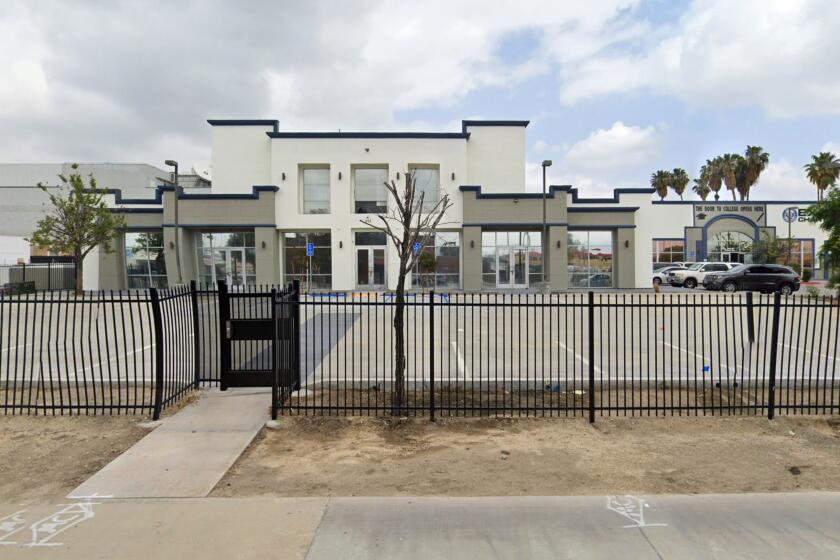Superior Court Judge to Return to D.A.’s Office : Courts: According to some, the sorry working conditions plaguing the county justice system are to blame.
San Diego Superior Court Judge Louis E. Boyle said Tuesday that he plans to step down from the bench at the end of the year, a surprise move that some say was prompted largely by the sorry state of the county’s court facilities.
Boyle notified court administrators and the governor’s office Monday of his decision to return to the county district attorney’s office, where he was a prosecutor for 14 years before becoming a judge in 1987.
A formal announcement is forthcoming, but Boyle confirmed Tuesday in an interview--surrounded by boxes and carts in his makeshift chambers at a downtown hotel--that he is leaving.
“I think I can do more in a supervisory role in the district attorney’s office to serve the community,” he said.
Boyle’s departure will mark the first time in recent history that a county judge has voluntarily left the bench to return to private practice or government work.
“I’ve got a feeling it won’t be the last,” he said.
Although Boyle repeatedly declined to blame working conditions for his departure, his resignation is seen by others at the courthouse as a comment on the plight facing county judges, especially new ones.
Michael I. Greer, the court’s presiding judge, said he shares Boyle’s feeling about judges leaving.
“I might lose more (judges). Nobody’s ever said that, but it could happen that I lose more,” Greer said. “I’ve heard a lot of dissatisfaction around here,” primarily due to unsatisfactory working conditions.
Those conditions--a shortage of courtrooms plus physical shortcomings at the downtown courthouse--mean that the court’s newer judges, such as Boyle, have been hearing cases at various impromptu and incongruous sites, including the Hotel San Diego across the street. Even a weight room in El Cajon has served as a court.
The constant shuttling from place to place, as well as the criminal caseload traditionally heard by newer judges, has resulted in grumbling among some of the more recent arrivals, who want both a fixed courtroom and the challenge of civil lawsuits, which usually are heard by more senior judges.
The targets of their criticism frequently have been Greer and Judith McConnell, who takes over as presiding judge this week, because they are the managers who assign judges to courtrooms.
A source who knew about Boyle’s decision and asked to remain unidentified said the judge’s “total dissatisfaction with the administration of the Superior Court” was behind his decision to leave. Greer, however, said that was not the case.
“This talk about the way (the court) is being administered is not the problem here,” he said. Boyle “is not saying he doesn’t like the way the court runs itself. He doesn’t like the fact that the court has inadequate space, is working out of a hotel and can’t do the job he feels has to be done.”
Boyle emphasized that it was not his “position to take parting shots at anybody, especially not Mickey Greer or Judy McConnell.” It was “not because of any great difficulty with court management” that he was leaving, he said.
“Needless to say, however, I wish we weren’t living out of shopping carts,” he said, referring to his assignment at the Hotel San Diego. “But that’s not the court’s fault.”
Greer conceded, meanwhile, that Boyle’s departure is likely to focus even more attention on court management--both he and McConnell, who could not be reached Tuesday for comment, have been outspoken about issues facing the county courts--and he said that junior judges sometimes have reason to complain.
“I don’t know how I would feel about the fact that I had to go from one courtroom to another,” he said. “I wouldn’t like it.”
The number of judges actually complaining is perhaps two or three, Greer said. However, he said, there is a real morale problem at the downtown courthouse, both among judges who are assigned there as well as among their staffers, because of the building’s physical condition.
Over the past two years, the courthouse has been plagued by a leaky roof, power blackouts, faulty heating and air conditioning, a sewage spill and the discovery that the building’s ceilings are laced with asbestos.
“It’s very difficult to keep morale up when people are working as hard as they are in these conditions,” he said. “It’s very difficult for morale. That’s what got to Lou Boyle.”
Boyle said it was an “honor” to have served as a judge but that after being a prosecutor and juggling any number of cases, it was “extremely frustrating” to be a judge hearing only one case at a time.
Boyle said his new job back at the district attorney’s office was still to be defined, although he said he would expect not to be in court.
A pay cut was in the offing, but it was “not significant,” he said. Superior Court judges earn $89,851 annually.
Boyle, who had been a Municipal Court judge since 1987, was appointed to the Superior Court bench March 6, one of seven appointees Gov. George Deukmejian announced on the same day. The appointments eased a backlog of criminal trials that Greer had said was so severe that there would be no new civil trials until help arrived.
Before taking the bench, Boyle had been a deputy district attorney since 1973 and was chief of the office’s East County division in El Cajon.
He received his bachelor’s degree from the University of Connecticut in 1961 and his law degree from the University of San Diego in 1972.
The timing of Boyle’s departure gives Deukmejian, who had two vacant slots on the 71-member bench to fill by the end of the year, a third opening.
More to Read
Start your day right
Sign up for Essential California for news, features and recommendations from the L.A. Times and beyond in your inbox six days a week.
You may occasionally receive promotional content from the Los Angeles Times.






